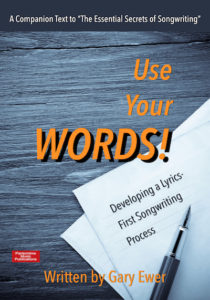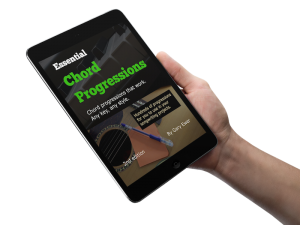In yesterday’s post I wrote about two-chord progressions, and how a song practically never suffers from a chord progression that’s short or boring. While that’s true, it doesn’t mean that a chord progression can’t help strengthen your song’s structure.
 If you’re hoping to give stronger meaning to your lyrics by using more creative chords, you need good lyrics in the first place! Right now, “Use Your Words! Developing a Lyrics-First Songwriting Process” is a FREE add-on to “The Essential Secrets of Songwriting 10-eBook Bundle.” Don’t miss this deal!
If you’re hoping to give stronger meaning to your lyrics by using more creative chords, you need good lyrics in the first place! Right now, “Use Your Words! Developing a Lyrics-First Songwriting Process” is a FREE add-on to “The Essential Secrets of Songwriting 10-eBook Bundle.” Don’t miss this deal!
One of the ways this can happen is by supporting or enhancing the meaning and mood of your song in general, and specifically your lyric. Progressions can generate moods that can be powerful partners with other elements of musical composition.
When creating chord progressions that match the mood and message of your lyric, there is a danger of falling into stereotypical traps: happy songs are major, sad songs are minor… that sort of thing.
So don’t be afraid to be creative. Here are some suggestions:
- Allow your verse progression to be more adventurous than your chorus progression. Because verses are where you’re likely to give important details of your song’s story, a creative chord progression can help support moods — a melancholy mood, by using chords that give a descending bass line, an uplifting mood by using rising bass lines, and so on. But choruses tend to use shorter progressions where the key is clear and the mood is somewhat more stable.
- Build the excitement level of music by considering harmonic rhythm. When we talk about harmonic rhythm we’re talking about how quickly a chord changes to the next one, with reference to the melody. So quick chord changes can build musical momentum and make music more exciting. Holding on to chords for a longer period of time before changing can help music relax.
- Sometimes stereotypes work. It’s actually true that music in a minor key might sound sad, if partnered with a slower tempo and sad lyrics. The same music, but with a major key progression, often enhances the melancholy side of sad. It’s why mixing mainly major with mainly minor progressions within the same verse can be so powerful. As the lyric moves back and forth between happy and sad aspects of a story, switching from major to minor can be a powerful tool to build those various moods.
- How open 5ths (power chords) affect music. Chords that are missing the third, otherwise known as “power chords,” tend to add a feeling of sombre strength to music. These chords dwell on and take advantage of the musical ambiguity that comes from having no 3rd. A power chord is commonly used in metal and other related genres. But you can still take advantage of the “quiet strength” that comes from a more quietly-played version of the chord, such as the beginning of Adele’s “Rolling in the Deep“, and “Turn It On Again” (Genesis). It’s a good choice for lyrics that describe dark introspection or opinions.
- Experiment with pedal point. Using a pedal point means keeping the same note as your bass note regardless of the chords above. Try it, and notice what it can do for a very basic progression: C F G C, but with C as your constant bass note. It’s hard to put a finger on exactly what pedal point does (in that case, it’s called a tonic pedal), but you’ll notice a freshness and sense of innovation.
Pedal point is also a good choice for chord progressions that are complex, because it acts as a kind of musical anchor, a kind of glue that helps the listener make sense of the complexity they’re hearing.
 Written by Gary Ewer. Follow Gary on Twitter.
Written by Gary Ewer. Follow Gary on Twitter.
 Looking for lists of progressions you can use in your own songs? “The Essential Secrets of Songwriting” eBook Bundle has 2 main collections, plus eBooks on how to harmonize your own melodies, and more.
Looking for lists of progressions you can use in your own songs? “The Essential Secrets of Songwriting” eBook Bundle has 2 main collections, plus eBooks on how to harmonize your own melodies, and more.










